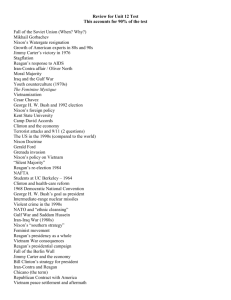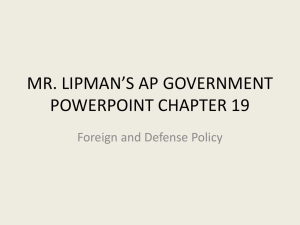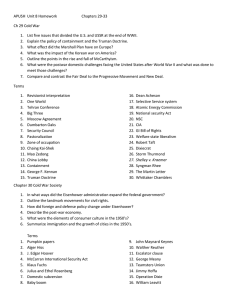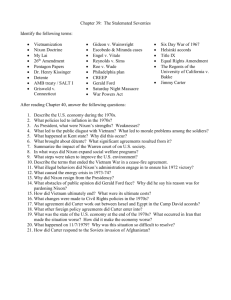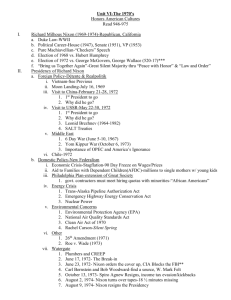Richard Nixon- Ronald Reagan
advertisement
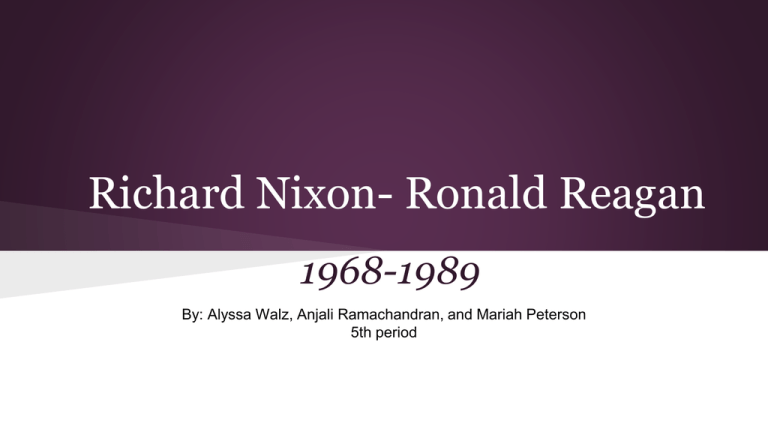
Richard Nixon- Ronald Reagan 1968-1989 By: Alyssa Walz, Anjali Ramachandran, and Mariah Peterson 5th period Richard M. Nixon 1969-1974 President Nixon Background to Election of ‘68 • Lyndon B. Johnson o Domestic Policy Great Society • Medicare, War on Poverty Voting Rights Act of 1965 • required federal government to guarantee African Americans and other minority groups the ability to vote o Foreign Policy Unofficial war with Vietnam • hawks vs. doves (Republicans/Conservative Democrats vs. left and Democratic Party) Party Presidential Conventions (1968) Democratic • Potential Candidates o o Hubert Humphrey Potential Candidates o Richard M. Nixon Former LBJ’s VP focused on securing delegate support middle path between liberals and conservatives avoided making controversial statements about Vietnam Running mate= Spiro Agnew Senator McCarthy Against LBJ’s Vietnam Policy Senator Kennedy • • • o Republican Assassinated after winning California primary Violent Anti War Protests in Chicago Humphrey won the nomination Presidential Election (1968) • • • • Republicans Candidate: Richard M. Nixon Background: o “hawk” on Vietnam policy o right-leaning (conservative) on domestic policy Democrats ● ● ● Platform o Victory in Vietnam o strong anti crime policy Target Voters o Goldwater conservatives o party moderates o white southerners ● Candidate: Hubert H. Humphrey Background ○ LBJ’s VP ○ former pharmacist, college professor, mayor, US Senator from Minnesota Platform ○ Pro-War Policy in Vietnam Target Voters ○ lacked full support of anti war Democrats ○ won black support because of support of civil rights legislation and social programs American Independent Party ● ● ● ● Candidate: George C. Wallace Background ○ Former governor of Alabama Platform ○ Racial Segregation ○ States’ rights ○ Anti-Big Govt ○ Repeal Great Society’s War on Poverty Vote ○ 46 electoral votes Results of ‘68 Presidential Election ● Nixon won the Election ○ with both popular votes and electoral college votes ● Significance ○ 1st election after the Voting Rights Act of ‘65 -> voter turnout among African Americans and other minorities greatly increased Vietnam War Effect on the economy: ● Drained tax money from improvements in education ● Scientific skill and manufacturing capacity away from the civilian sector ● Stagflation- describes a situation where the inflation rate is high, the economic growth rate slows down, and unemployment remains steadily high ○ Why was there inflation? ■ large military and welfare spending are inflationary because it put money in people’s hands without adding to the supply of goods that the money can buy. ● Increase in oil prices Vietnam War Continued... ● Widening the War… plan is to clean out the enemy sanctuaries in Cambodia ○ led to… ■ senate repealing the Gulf of Tonkin “blank check” ■ protests ● Kent State University- protested the invasion of Cambodia, killed 4 and wounded 9 ● Jackson State College- protested the invasion of Cambodia, killed 2 and wounded 12 Kent State University protest after shooting. Vietnam War Continued... ● President Nixon developed Vietnamization (“peace with honor”) ○ This was a plan to withdraw US troops in South Vietnam over an extended period of time gradually turning power over to the South Vietnamese. ○ Criticisms? ■ Doves* wanted them out NOW, not over an extended period of time ■ draft exclusions (men in college and with essential civilian skills) ● This meant many underprivileged men were sent to war, many of them being blacks. ● My Lai massacre- mass murder of hundreds of villagers in the village of My Lai by US soldiers *Doves vs Hawks- violent fights occurred between the two groups. The doves opposed the Vietnam War and the hawks we for it. My Lai massacre Vietnam War Continued... ● Nixon Doctrine- proclaimed that the US would honor its existing defense commitments, but that in the future, Asians and others would have to fight their own wars without the support of American troops ● Pentagon Papers- pentagon study of American involvement in the Vietnam War from 1945-1967 that was published in the New York Times Newspaper ○ ● Revealed flaws in Kennedy and Johnson's administration ■ secretly bombing Cambodia (neutral country) without Congress or American citizens knowing about it ■ continued to bomb North Vietnam after the cease fire ● War Powers Act- required the president to report to congress within 48 hours after committing troops to a foreign conflict In 1973 the U.S. and In 1973 the U.S. and Vietnam signed a peace treaty ○ this ended the Vietnam war Relations with the USSR and China • • • • SALT- Strategic Arms Limitations Talks o led to the Anti-Ballistic Missile Treaty and an interim agreement between the USSR and the United States. ABMT- Anti-Ballistic Missile Treaty o limited the amount of anti-ballistic missile (ABM) systems allowed within the United States and the USSR. Nixon sent his Secretary of State Henry Kissinger to China on a diplomatic mission in Beijing to better the United States relationship with China. One year after Kissinger went to China, Nixon himself went to China on a diplomatic mission. o Led to “Détente”, or the easing of strained relationships between the USSR and the United States. Supreme Court Rulings Under the Nixon Administration • United States v. Washington Post • • • o Fight to release the Pentagon Papers Swann v. Charlotte-Mecklenburg Board of Education (1971) o the bussing of African-American children to integrated schools Roe v. Wade, (1973) o disallowed many state and federal restrictions on abortion in the United States United States v. Nixon, (1974) o the president cannot use executive privilege to withhold evidence that is "demonstrably relevant in a criminal trial." The decision in Roe vs Wade is still one of the most controversial decisions of today. Environment ● Rachel Carson○ author that published “Silent Spring” ○ exposed the poisonous effects of pesticides ● Environmental Protection Agency (EPA)○ Agency of the US government that sets and enforces national pollution control standards. Rachel Carson Other Important Actions Under Nixon ● Liberal Domestic Actions○ expansion of welfare programs ○ increase appropriations or entitlements like food stamps and medicaid ■ ● ● results: raised social security old age pensions, supplemental security income Economic Actions○ imposed a 90 day wage and price freeze to stimulate exports ○ took the US off the gold standard ○ ended the “Bretton Woods” system of international currency stabilization Philadelphia plan (1969)- required construction of trade unions working on federal contracts in Philadelphia to establish “goals and timetables” for the hiring of black apprentices ○ required thousands of employers to meet hiring quotas or to establish “set- Election of 1972 • Incumbent President Richard M. Nixon o Republican Candidate Emphasized the good he had done for the economy, and his success in foreign affairs. George McGovern o Democratic candidate Ran on an anti-war platform ● Nixon wins in a landslide. ○ Nixon won by the widest margin ever, with almost 18 million more popular votes than McGovern. ○ won every state except for Massachusetts • Election of 1972 Consequences of the Yom Kippur War ● Egypt and Syria vs Israel (Israel won) ● The US supported Israel which caused an embargo on oil ○ lines for automobiles ○ deepened the business recession ○ developed an Alaskan pipeline ○ national speed limit (55 mph) ○ heavier use of coal and nuclear power ○ fuel efficient engines ○ creation of Organization of the Petroleum Exporting Countries (OPEC) ○ established that the US was dependent on oil Oil embargo Watergate The term “watergate” describe a series of political scandals which occurred during the Nixon administration, between 1972 and 1974. • Several men broke into the Watergate hotel and attempted to bug phone lines and steal secret documents from the office of the Democratic Party’s National Committee on June 17, 1972. o The prowlers were connected to President Richard Nixon’s reelection campaign. o No one can be sure if Nixon knew about the Watergate operation beforehand, but it is clear that he took steps to cover it up afterwards. Deep Throat: the cover-name given to the secret informant (later revealed to be former FBI Associate Director Mark Felt.) who provided information to The Washington Post about Richard Nixon and his administration’s involvement in the Watergate scandal. • This scandal only brought more divisions to the country which Nixon was trying to unite. Gerald Ford 1974-1977 “I assume the presidency under extraordinary circumstances… This is an hour of history that troubles our minds and hurts our hearts.” President Ford The Unelected President ● Spiro Agnew was forced to step down from his position as VicePresident, due to tax evasion. ○ Nixon nominated Gerald R. Ford to be the new Vice-President and he was confirmed by Congress. ■ He was chosen because he had a reputation for being an honest politician. ● President Ford was a “president without precedent” ○ When Nixon resigned to avoid impeachment, Ford became the first U.S. President to have not been elected to office. ■ He also the succeeded the first president ever to resign. Ford’s Actions ● He granted a presidential pardon to Nixon ○ This ruined his chances of getting elected again ■ brought about rumors of a “Buddy Deal” ● Helsinki Accords○ In Helsinki, Finland ○ held to end World War 2 by legitimizing the Soviet dictated boundaries of Poland and Eastern European countries Tasks at Hand • • Master inflation o Inflation was kicked into overdrive by the OPEC oil embargo of 1974 and the elimination of wage/price controls instituted by Nixon. Revive the economy o the economy had slipped into a depression, due to the huge inflation rates ● Solve the energy shortages ○ Oil embargo by OPEC • Try to ensure world peace o Tensions were high everywhere, with the Cold War, the remaining tensions (albeit improved since the Nixon administration) between the U.S. and China, and other warring countries around the world Womens Rights Movement • “2nd wave” ● Phyllis Schlafly○ opposed the women's movement ● Title IX○ prohibited sex discrimination in any federally assisted educational programs ● Equal Rights Amendment 1972 ○ It fell just three states short of ratification Phyllis Schlafly Jimmy Carter 1977-1981 “For myself and for our Nation, I want to thank my predecessor for all he has done to heal our land.” President Carter Election of 1976 • • • Bicentennial election Incumbent Gerald H. Ford o Republican candidate chances at re-election tainted by his administration Jimmy (James) Carter o Democratic candidate status as a relatively unknown politician and a Washington outsider, and moderate reformer Foreign Policy and Actions • • • • Dealing with the USSR: Completed negotiations of the SALT II nuclear limitations treaty Dealing with China: he insured full diplomatic relations with the People’s Republic of China o this built on the work of former presidents, namely Nixon Ratified the Panama Canal treaty and the Neutrality Treaty in 1977 o Promised to cede control of the Canal to the people of Panama by the year 2000 Camp David Agreements of 1978 o helped bring amnesty between Egypt and Israel Middle East ● Camp David Accords○ The Egyptian President, Anwar Sadat, and prime minister of Israel, Menachem Begin, came to Camp David ○ persuaded them to sign an accord ■ Israel would withdraw from Sinai ■ Egypt would respect Israel's new leaders Camp David Accords Economy Under Carter During his presidency Carter had to deal with huge economic problems left over from former administrations, but he aptly rose to the occasion. • • • • • Growing Deficit rising energy costs o After the OPEC embargo oil prices skyrocketed Continued tensions with foreign countries o China o USSR Huge inflation Huge unemployment rates By the end of his presidency he had substantially reduced the deficit and created 8 million new jobs. However inflation and interest rates remained at near record Other Actions by Carter • Inflation and international debt ● Energy Crusade ○ caused by OPEC oil prices and inflation ○ “the moral equivalent of war” ○ called for legislation to improve energy conservation ■ failed ● Increased human and social services ○ Created the department of education ○ bolstered the social security system ○ appointed record number of blacks, women and hispanics to government jobs Setbacks of the Carter Administration • • USSR invasion of Afghanistan caused the suspension of plans for ratification of the SALT II pact. 52 U.S. citizens working in the U.S. embassy based in Iran were seized as hostages. o Embassy overrun by an angry group of young Islamic revolutionaries. the former Shah was suffering from cancer, and came to the U.S. for treatment the angry mob of revolutionaries demanded his return, so he could be prosecuted. the American diplomats were held hostage for 444 days Released the day the Carter left office and Reagan took over • Ronald Reagan 1981-1989 Promised during his campaign to, restore “the great confident roar of American progress and growth and optimism.” President Reagan Presidential Election of •1980 • • Ronald Reagan o Republican Candidate Conservative “trickle down” economics o Reinvigorate the American people and decrease their reliance on the government. Incumbent Jimmy Carter o Democrat Big government fiscal discipline John B. Anderson o Republican but ran as an independent candidate Presidential Election of 1980 Cont. • Reagan won because he was a vivacious personality who won the hearts of people all across America, and because the people believed he would be the best person to deal with the hostage situation. o January 20th, 1981- inauguration day and Iran released the hostages Iran hostage crisis All About Reagan ● Goals: ○ change government spending ■ cut $45 billion in social programs ■ he accomplished this because he wooed “boll weevils”, southern conservative democrats, to get his way ○ “Peace through strength” ● Assassination attempt 69 days into his presidency ○ March 30th, 1981 ○ collapsed left lung ○ His grace and wit after the incident caused his popularity to soar Economy under Reagan ● “supply-side” economics ○ economic growth can be created by lowering barriers for people to produce goods ● made many tax cuts to stimulate investment, boost productivity, foster dramatic economic growth, and reduce federal deficit ○ Eliminated many tax deductions for the very wealthy, and created exemptions for people with very low income. ■ “Do you think a millionaire should pay more taxes than a bus driver?” ● Recession of 1982○ unemployment ○ bank failures ○ caused by anti inflationary “tight money” policies ● Military spending Presidential Election of 1984 ● Democrats • Republicans ○ Candidate: Mondale ○ Running Mate: Geraldine Ferraro ■ 1st Women appearing on major party presidential ticket ○ Candidacy tainted because he was Carter’s Vice President o Candidate: Ronald Reagan o Bolstered by buoyant economy and popular persona New Soviet Leader “Mr. Gorbachev, open this gate. Mr. Gorbachev tear down this wall.” -President Ronald Reagan • Mikhail Gorbachev (1985) o Personality: o Personable, Energetic, Imaginative, Committed to Radical Reform Policies: Glasnost (“openness”) • aimed to ventilate the secretive repressiveness of Soviet society by introducing free speech and some political liberties Perestroika (“restructuring”) End of Cold War • Glasnost and Perestroika: • Summit Meetings: required that the USSR shrink the size of military and redirect energy to civilian economy o Geneva (Nov. 1985) USSR would cease to deploy intermediate-range nuclear forces (INF) targeted on Western Europe o Iceland (Oct. 1986) Stalemate o Washington DC (Dec. 1987) INF treaty- banning all intermediate-range nuclear missiles from Europe o Moscow (May 1988) Wrapped up negotiations end to the cold war Iran Contra • • • Background Information o continuing captivity of American hostages in Middle East o continuing grip of power of left-wing Scandinista government in Nicaragua Scandal o US diplomats secretly arranged arms sales to the Iranians in return for Iranian aid in rescuing the hostages o Payment for arms sales were diverted to the contra rebels in Nicaragua Effects o Iran-contra affair often overshadowed Reagan’s achievement with the Soviets A political cartoon which depicts the Iran Contra scandal. Economics Under Reagan ● HUGE deficit ○ unlucky for future generations ○ unequal distribution of income ● Twin towers of deficit ○ 1. federal budget ○ 2. international trade deficit ○ Black Monday■ October 19, 1982 ■ leading stock market index decrease 508 points (largest 1 day decline in history) Scandals ● Environmental protection agency resigned because of misappropriation of funds ● Secretary of labor ○ charges of fraud and larceny ● Personal aid ○ convicted of perjury ● Chief law enforcement officer ○ influence pedaling Reagan’s Terms • First Term o Focus on domestic affairs shrinking federal government reducing taxes • Second Term o Foreign Policy Issues USSR and Cold War Supreme Court Cases (‘68-’89) • • • • Gideon v. Wainwright (1963) o all defendants in serious criminal cases were entitled to legal counsel Escobedo v. Illinois (1964) & Miranda v. Arizona (1966) o ensured the right of the accused to remain silent Engel v. Vitale (1962) o voted against requiring prayers and Bible Reading in public schools (based off of the 1st Amendment) Roe v. Wade (1973) o legalized abortion Amendments to the Constitution • • Amendment XXV: In case of the removal or death of the President, the Vice President shall become the President Amendment XXVI: Right of Citizens, 18 or older, in the United States to vote Summary Nixon ● End of Vietnam War ● Watergate ● Resigned ● Détente Ford ● granted a presidential pardon (Nixon) ● unelected president Carter ● Camp David Accords ● Iran hostage situation ● oil embargo ● HIGH Inflation ● SALT 2 Reagan ● Iran Contra ● end of the Cold War ● BIG deficit QUIZ Who was the candidate for the American Independent Party?” George C. Wallace What are two things that were on the American Independent Party Platform? Segregation, anti big government, repeal Great Society’s War on poverty, and state’s rights. What were the effects of widening the war? Protests at Kent State University and Jackson State College. Who were the Doves and who were the hawks? The doves were the people who opposed the Vietnam War and the hawks were the people who were for the war. What was the strategy that President Nixon developed to get American troops out of Vietnam? Vietnamization What was the supreme court ruling US vs Nixon about? The president cannot use executive privilege to withhold what is “demonstrably relevant in a criminal trial” In the election of 1972, Nixon won every state except for... Massachusetts What were 3 effects of the Yom Kippur War? lines for automobiles, deepened the business recession, developed an Alaskan pipeline, national speed limit, heavier use of coal and nuclear power, fuel efficient engines, creation of OPEC, and established that the US was dependent on oil. Who was the unelected president and why was he chosen to assume the presidency? Gerald Ford; he had a reputation for being an honest politician. What were the Helsinki Accords? Held to end World War 2 by legitimizing the Soviets dictated boundaries of Poland and Eastern European countries. What is Title IX? It prohibited sex discrimination in any federally assisted educational programs. What are two main events that occurred during Carter’s presidency? Camp David Accords, Iran hostages, inflation, SALT 2, and the oil embargo. When were the hostages in Iran released? (may say and event) January 20th, 1981; Ronald Reagan’s inauguration How did government spending change while Reagan was president? There was increased military spending and less spent on social programs. What was Reagan wanting to use lots of the money for military spending on? SDL (Star Wars) What is “supply side” economics? It is when economic growth is created by lowering barriers for people to produce goods. What were the two policies Gorbachev wanted to achieve? Glasnost and perestroika. What happened in the Iran Contra scandal? US diplomats secretly arranged arms sales to the Iranians in return for Iranian aid in rescuing the hostages. Payment for arms sales were diverted to the contra rebels in Nicaragua. What happened on Black Monday? leading stock market index decrease 508 points (largest 1 day decline in history) What were 2 important events that happened during Reagan’s presidency? Iran contra, hostages released, and end of cold war. *BONUS QUESTION!* When did President Reagan’s assassination attempt occur? October 19, 1982
